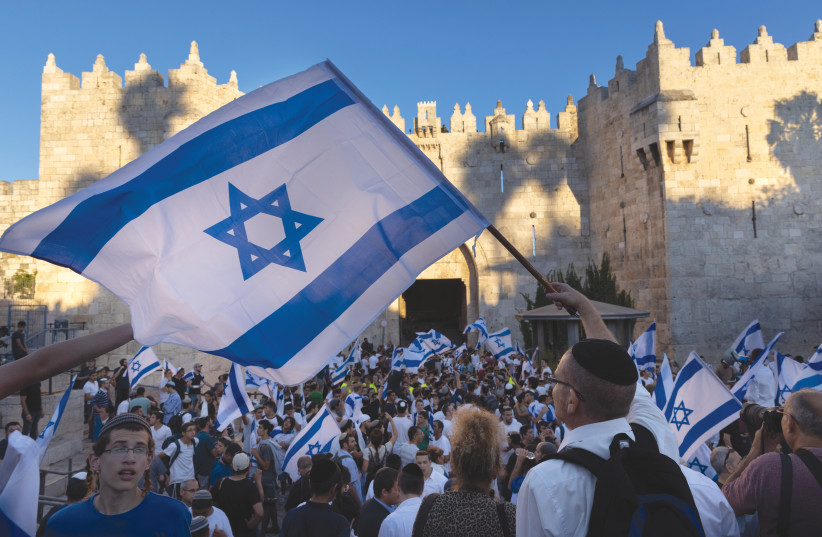Prime Minister Naftali Bennett received a comprehensive security briefing on preparations by Israel Police ahead of Sunday's controversial flag march in Jerusalem, after Public Security Minister Omer Bar-Lev said on Wednesday that the route would include marchers going through Damascus Gate and the Muslim Quarter, as they head to the Western Wall.
According to a statement released at the time, Bar-Lev said that he accepted the recommendation of Israel Police chief Kobi Shabtai that the march, which is part of Jerusalem Day celebrations, will take place “as it has been customary for most years in the past,” stopping before reaching the Temple Mount.
The government's decision to allow the march to go through has stoked fears that it could lead to renewed violence between Israeli forces securing it and Palestinian rioters.
Despite this, Bennett called for "business as usual" on the Temple Mount on Sunday, as updated situational assessments will be held throughout the weekend.
According to Ynet News, defense officials advised the prime minister to stick to the planned route, as any last-minute change would be seen as a sign of weakness on Israel’s part.

Shabtai and Bar Lev attended the briefing, as well as other security officials in the government and police.
Security forces on high alert
Israeli security forces were put on high alert ahead of the march, with additional mobile shelters deployed to cities in the South, and an increase in police presence in Jerusalem and other mixed Jewish-Arab cities.
While the military is still unsure if the flag march on Jerusalem Day will pass quietly, the IDF has deployed additional mobile bomb shelters, including in the college town of Sderot, in case terror groups from the Gaza Strip fire rockets toward the South.
The IDF later clarified that the additional bomb shelters were placed in the South not because of Jerusalem Day, but as part of a pre-planned deployment by the Home Front Command in an attempt to fortify the South.
Shabtai ordered a high alert in Jerusalem, including deploying 3,000 additional police officers to the capital and hundreds more to mixed cities.
The decision, taken in conjunction with the Shin Bet (Israel security agency), comes as both Hamas and Palestinian Islamic Jihad have threatened to launch rockets, warning Israel against allowing Jews to “storm” the Aqsa Mosque compound during the flag march.
The groups said in a statement after an emergency meeting that this would be a barrel of dynamite to ignite the entire region.
“Jerusalem and the holy sites are a red line,” the statement read. “Our people, with their resistance and forces... will use all options to defend our people and holy sites against Zionist assaults.”
They called on Palestinians to “defend the lands and holy sites,” urging them to take to the streets carrying Palestinian flags and to clash with Israeli security forces.
The US Embassy in Israel also issued an alert to citizens and embassy employees, warning them to refrain from entering Jerusalem’s Old City at any time on Sunday, and on Friday when there is a higher turnout for prayer on the Temple Mount.
“Due to ongoing tensions and potential security issues in the Old City of Jerusalem, the following restrictions on US government employees and their families remain in effect until Monday, May 30,” the alert said. “Damascus Gate will continue to remain off-limits after May 29 until further notice.”
The embassy also warned citizens to treat every alert of an incoming rocket as real and to seek shelter immediately.
Hamas leader Ismail Haniyeh warned last week that the group “will confront [Israel] with all of our capabilities,” and that the Palestinian people “would not accept the passage of such Talmudic Jewish nonsense. Our decision is clear and unhesitating... We will resist with all our capabilities and we will not allow the violation of al-Aqsa Mosque or thuggery in the streets of Jerusalem.”
“We will confront [Israel] with all of our capabilities.”
Hamas leader Ismail Haniyeh
World response
US Ambassador Tom Nides spoke with Bar-Lev on Thursday about the flag march, but did not ask him to change the route.
UN Special Coordinator for the Middle East Peace Process Tor Wennesland called the march provocative when he briefed the UN Security Council on Thursday.
“I urge authorities to take wise decisions to minimize confrontations, frictions and the risk of more violence,” he said.
Irish Ambassador Byrne Nason said her country was concerned the march would “escalate tensions.” Israel’s deputy ambassador, Noa Furman, took issue with the concerns expressed by a number of Security Council member states, accusing them of adopting a narrative promoted by anti-Israel terror groups such as Hamas.
This is a “yearly event” that goes along a route that has been largely unchanged for 30 years, Furman said, and has nothing to do with issues of the status quo on the Temple Mount.
This “is a peaceful event” that has been twisted into an attack on the status of Jerusalem by a “terror group” she said, adding that unfortunately, there are some in the international community who have rushed “to adopt the sick narrative of terrorist” groups like Hamas and Hezbollah.
“By promoting the lies of Hamas and Hezbollah, they are legitimized,” Furman said, explaining that once this narrative is legitimized, “violence will occur.”
Operation Guardian of the Walls
Ahead of the war last year, Israeli security forces increased their alert level and sent more than two and a half extra reinforcement battalions. The IDF also placed Iron Dome batteries in central Israel.
Hamas later fired seven missiles toward Jerusalem during the march, sending thousands to shelters.
The IDF retaliated, and over the course of 11 days, more than 4,000 rockets and mortars were fired at Israel, killing 12 civilians and one soldier. Israeli strikes against Hamas and Palestinian Islamic Jihad killed at least 243 Palestinians, most of them combatants.
Khaled Abu Toameh and Tovah Lazaroff contributed to this report.
